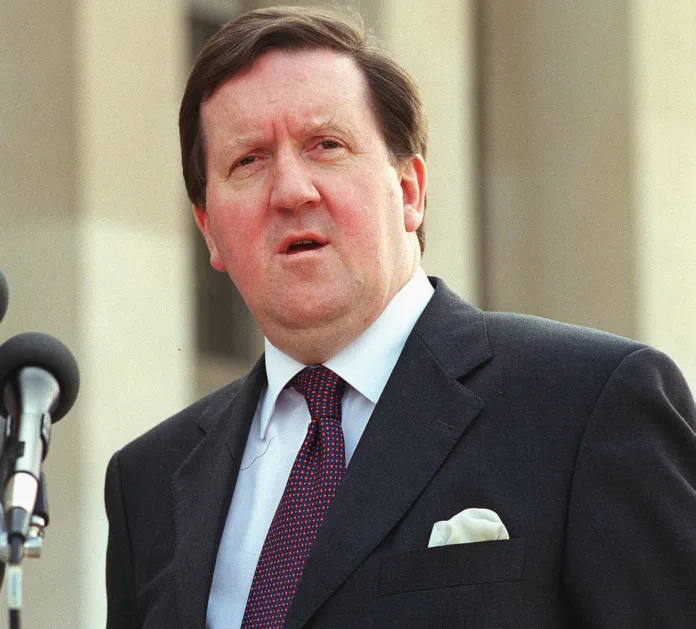Defence expert George Robertson warns that China, Russia, Iran, and North Korea are increasingly collaborating against Western interests
In a striking warning, George Robertson, the newly appointed head of Labour’s defence review, identified a “deadly quartet” of nations threatening the UK and its allies. This coalition includes China, Russia, Iran, and North Korea, which Robertson claims are increasingly working together against Western interests.
During a briefing alongside Defence Secretary John Healey, Robertson stressed the importance of preparing for potential confrontations with these states. He noted that the alliance among these nations poses the most significant threat to UK security, especially as the menace of Islamist terrorism wanes.
Embed from Getty ImagesRobertson, a former NATO Secretary General, articulated the urgency of the situation: “We’re confronted by a deadly quartet of nations increasingly collaborating,” emphasizing that Britain and its NATO allies must be equipped to tackle this growing challenge. His comments come amid a strategic shift in the UK government’s rhetoric towards China, which has transitioned from being viewed as a “systemic challenge” to a direct threat.
This shift reflects a broader consensus reached during the recent NATO summit in Washington, where the alliance publicly rebuked China for its support of Russia’s military actions in Ukraine. Robertson remarked that the NATO summit made it “perfectly clear” that the threat posed by China should be taken seriously, warning that developments in the Asia-Pacific region could quickly impact Europe.
Iran and North Korea have also played significant roles in supporting Russia’s invasion of Ukraine. Iran has supplied drones, while North Korea has provided artillery shells. This collaboration not only strengthens Russia’s military capabilities but also influences tactics used in other regional conflicts, exemplified by Iran’s missile strikes on Israel following an attack on its embassy in Damascus.
President Joe Biden recently highlighted the increasing coordination among these four nations, expressing concern over their growing collaboration. He urged China’s President Xi Jinping to recognize the consequences of continuing to assist Russia.
Robertson’s remarks coincide with the announcement of a three-person defence review team, which includes prominent experts such as Fiona Hill and General Sir Richard Barrons. Healey praised this team as the “very best combination of external experts” to navigate the complex landscape of national security.
The defence review aims to set strategic priorities for the UK’s defence and foreign policy in light of ongoing global tensions, including the conflict in Ukraine and instability in the Middle East. Healey envisions this review as “Britain’s defence review,” emphasizing its significance beyond party politics.
As part of the review, Labour has committed to increasing defence spending to 2.5% of GDP, which will represent a substantial investment in national security. Healey has also assured that he does not intend to cut armed forces numbers, addressing concerns about the declining size of the British Army.
In this volatile environment, Healey’s leadership signifies a pragmatic approach to the UK’s role within NATO, regardless of future political changes in the United States. He affirmed that the alliance’s durability remains strong, stating, “We will work with whatever president is elected,” reinforcing the UK’s commitment to collective security.
Analysis:
Political Perspective: The identification of a “deadly quartet” underscores a pivotal moment in global politics, showcasing a united front against the collective threats posed by these nations. The strategic collaboration among China, Russia, Iran, and North Korea necessitates a reassessment of foreign policy priorities. This growing alliance challenges the traditional notions of power dynamics, compelling the UK and its NATO allies to adopt more robust defensive strategies. Additionally, Robertson’s comments reflect a significant shift in Labour’s stance, indicating an evolving political landscape focused on national security.
Social Perspective: The discourse surrounding the “deadly quartet” resonates deeply with the public’s growing awareness of geopolitical threats. As citizens become more informed about international relations, there is an increased demand for accountability from leaders. This awareness influences social movements advocating for stronger national security measures and greater transparency regarding government actions in foreign policy.
Racial Perspective: The evolving nature of global alliances also highlights the racial dimensions of security. The involvement of nations with diverse political ideologies and histories raises questions about how these dynamics affect marginalized communities within their borders. Understanding the implications of such alliances is crucial for addressing historical injustices and fostering inclusive policies.
Gender Perspective: The ongoing geopolitical tensions necessitate a more inclusive approach to national security discussions. Historically, women’s perspectives have been underrepresented in defence dialogues. The involvement of experts like Fiona Hill in the defence review signals a positive shift toward incorporating diverse viewpoints, which can lead to more comprehensive and effective security strategies.
Economic Perspective: The economic implications of confronting the “deadly quartet” are significant. Increased defence spending and investment in military capabilities may have direct effects on domestic budgets and social programs. However, the push for enhanced security could also stimulate growth in the defence industry and create jobs, presenting a complex interplay between economic priorities and national security.
